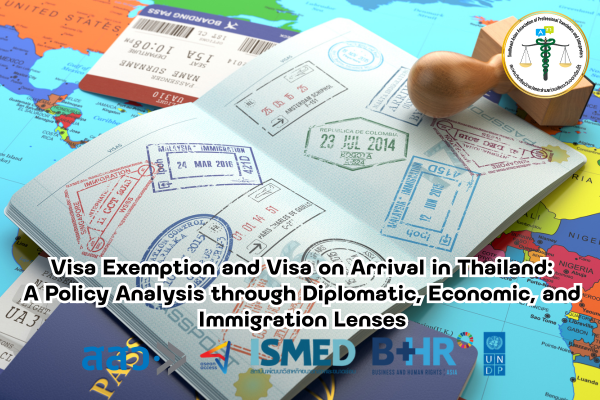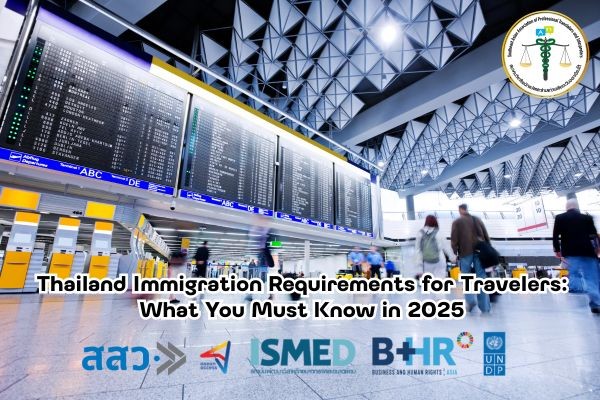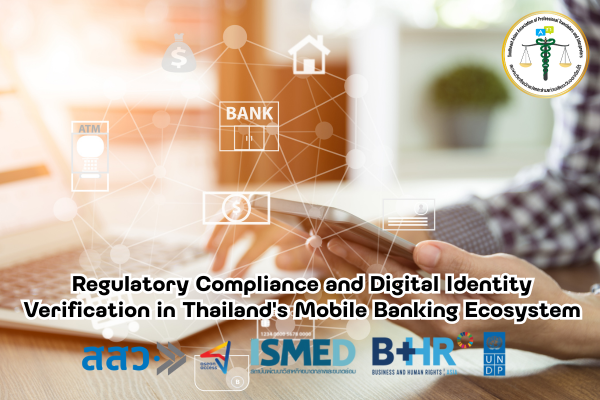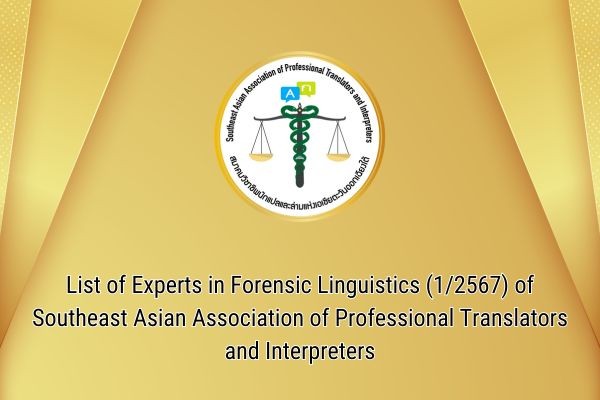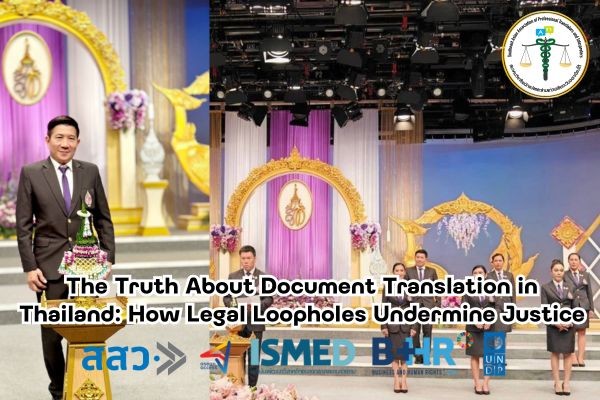Setting Up a Company in Thailand: A Beginner’s Guide
10 January 2025, Bangkok – This article aims to provide important information for those interested in starting a business in Thailand, a country with a rapidly growing economy and abundant business opportunities. Establishing a company in Thailand requires a thorough understanding of relevant laws and procedures, offering a variety of business structures ranging from private limited companies to branches or representative offices.
Understanding Foreign Business Law and Thai Companies
Conducting business in Thailand must comply with the Foreign Business Act B.E. 2542 (1999), which limits activities foreigners can engage in, as well as the requirements for obtaining a Foreign Business License or applying for benefits from the Board of Investment (BOI). BOI provides various incentives, including 100% foreign ownership, tax support, and work permits for foreign employees.
Choosing the Right Business Structure
There are several types of business entities in Thailand, such as private limited companies, general partnerships, and branches. Each type has its own advantages and challenges. For instance, private limited companies are the most popular among foreign investors as they limit liability and allow foreigners to hold up to 49% of the shares, while partnerships and branches come with more administrative complexities and tax obligations.
The Importance of Certified Translators and Interpreters
In business activities in Thailand, the involvement of certified translators, translation certifiers, and interpreters from SEAProTI (Southeast Asian Professional Association for Translators and Interpreters) plays a crucial role. They facilitate smooth communication and accurate documentation, ensuring compliance with Thai law in business registration, licensing, and essential documentation management.
Certified translators and interpreters from SEAProTI assist in translating important documents such as Memorandums of Association, tax documents, and business contracts, ensuring accuracy and adherence to Thai legal standards. Additionally, translation certifiers from the association ensure that translated documents meet legal requirements.
Business Registration Process
After selecting the appropriate business structure, the next step is registering the company with the Department of Business Development (DBD). This process includes reserving a company name, preparing necessary documents such as the Memorandum of Association, and managing tax obligations, including specialized permits according to the nature of the business.
Conclusion
Starting a business in Thailand requires a deep understanding of legal frameworks and procedures. Consulting with experienced local professionals will make the process smoother and more efficient. The involvement of certified translators, translation certifiers, and interpreters from SEAProTI ensures that all documentation is accurate and meets the legal standards required by Thai law.
About SEAProTI’s certified translators, translation certification providers, and certified interpreters:
The Southeast Asian Association of Professional Translators and Interpreters (SEAProTI) has officially announced the criteria and qualifications for individuals to register as “Certified Translators,” “Translation Certification Providers,” and “Certified Interpreters” under the association’s regulations. These guidelines are detailed in Sections 9 and 10 of the Royal Thai Government Gazette, issued by the Secretariat of the Cabinet under the Office of the Prime Minister of the Kingdom of Thailand, dated July 25, 2024, Volume 141, Part 66 Ng, Page 100.
To read the full publication, visit: the Royal Thai Government Gazette
เริ่มต้นธุรกิจในประเทศไทย: คู่มือสำหรับผู้เริ่มต้น
10 มกราคม 2568, กรุงเทพมหานคร – บทความนี้มีเป้าหมายเพื่อให้ข้อมูลสำคัญแก่ผู้ที่สนใจเริ่มต้นธุรกิจในประเทศไทย ซึ่งเป็นประเทศที่มีเศรษฐกิจเติบโตอย่างรวดเร็วและมีโอกาสทางธุรกิจมากมาย การจัดตั้งบริษัทในประเทศไทยต้องอาศัยความเข้าใจในกฎหมายและขั้นตอนที่เกี่ยวข้อง โดยมีรูปแบบโครงสร้างธุรกิจที่หลากหลาย เช่น บริษัทจำกัด สาขา หรือสำนักงานตัวแทน
ทำความเข้าใจกฎหมายธุรกิจของคนต่างด้าวและบริษัทในประเทศไทย
การดำเนินธุรกิจในประเทศไทยต้องเป็นไปตามพระราชบัญญัติการประกอบธุรกิจของคนต่างด้าว พ.ศ. 2542 ซึ่งกำหนดข้อจำกัดสำหรับกิจกรรมที่คนต่างด้าวสามารถทำได้ รวมถึงข้อกำหนดในการขอใบอนุญาตประกอบธุรกิจของคนต่างด้าว หรือการสมัครรับสิทธิประโยชน์จากสำนักงานคณะกรรมการส่งเสริมการลงทุน (BOI) โดย BOI มีสิทธิประโยชน์หลายอย่าง เช่น การถือหุ้นต่างชาติ 100% การสนับสนุนทางภาษี และการออกใบอนุญาตทำงานให้กับพนักงานต่างชาติ
การเลือกโครงสร้างธุรกิจที่เหมาะสม
มีหลายประเภทของนิติบุคคลในประเทศไทย เช่น บริษัทจำกัด ห้างหุ้นส่วนสามัญ และสาขา แต่ละประเภทมีข้อดีและข้อจำกัดที่แตกต่างกัน ตัวอย่างเช่น บริษัทจำกัดเป็นที่นิยมในหมู่นักลงทุนต่างชาติ เพราะมีการจำกัดความรับผิดชอบและอนุญาตให้คนต่างด้าวถือหุ้นได้ถึง 49% ในขณะที่ห้างหุ้นส่วนและสาขาอาจมีความยุ่งยากด้านการบริหารและภาษีมากกว่า
ความสำคัญของนักแปลและล่ามที่ได้รับการรับรอง
ในการดำเนินธุรกิจในประเทศไทย การมีนักแปล ผู้รับรองการแปล และล่ามที่ได้รับการรับรองจาก SEAProTI (สมาคมนักแปลและล่ามมืออาชีพแห่งเอเชียตะวันออกเฉียงใต้) มีบทบาทสำคัญอย่างยิ่ง พวกเขาช่วยให้การสื่อสารเป็นไปอย่างราบรื่นและการจัดการเอกสารมีความถูกต้อง ตรงตามข้อกำหนดของกฎหมายไทยในกระบวนการจดทะเบียนธุรกิจ การขอใบอนุญาต และการบริหารจัดการเอกสารที่จำเป็น
นักแปลและล่ามที่ได้รับการรับรองจาก SEAProTI มีหน้าที่ช่วยแปลเอกสารสำคัญ เช่น หนังสือบริคณห์สนธิ เอกสารภาษี และสัญญาทางธุรกิจ เพื่อให้มั่นใจว่ามีความถูกต้องและสอดคล้องกับมาตรฐานทางกฎหมายของไทย นอกจากนี้ ผู้รับรองการแปลจาก SEAProTI ยังช่วยยืนยันว่าเอกสารที่แปลเป็นไปตามข้อกำหนดทางกฎหมาย
กระบวนการจดทะเบียนธุรกิจ
หลังจากเลือกโครงสร้างธุรกิจที่เหมาะสม ขั้นตอนต่อไปคือการจดทะเบียนบริษัทกับกรมพัฒนาธุรกิจการค้า (DBD) ซึ่งรวมถึงการจองชื่อบริษัท การเตรียมเอกสารที่จำเป็น เช่น หนังสือบริคณห์สนธิ และการจัดการภาษี รวมถึงการขออนุญาตเฉพาะตามลักษณะของธุรกิจ
สรุป
การเริ่มต้นธุรกิจในประเทศไทยต้องอาศัยความเข้าใจในกรอบกฎหมายและขั้นตอนที่เกี่ยวข้อง การปรึกษาผู้เชี่ยวชาญในท้องถิ่นที่มีประสบการณ์จะช่วยให้กระบวนการเป็นไปอย่างราบรื่นและมีประสิทธิภาพ การมีนักแปล ผู้รับรองการแปล และล่ามจาก SEAProTI ช่วยให้มั่นใจว่าเอกสารทุกฉบับมีความถูกต้องและตรงตามมาตรฐานทางกฎหมายของประเทศไทย
เกี่ยวกับนักแปลรับรอง ผู้รับรองการแปล และล่ามรับรองของสมาคมวิชาชีพนักแปลและล่ามแห่งเอเชียตะวันออกเฉียงใต้
สมาคมวิชาชีพนักแปลและล่ามแห่งเอเชียตะวันออกเฉียงใต้ (SEAProTI) ได้ประกาศหลักเกณฑ์และคุณสมบัติผู้ที่ขึ้นทะเบียนเป็น “นักแปลรับรอง (Certified Translators) และผู้รับรองการแปล (Translation Certification Providers) และล่ามรับรอง (Certified Interpreters)” ของสมาคม หมวดที่ 9 และหมวดที่ 10 ในราชกิจจานุเบกษา ของสำนักเลขาธิการคณะรัฐมนตรี ในสำนักนายกรัฐมนตรี แห่งราชอาณาจักรไทย ลงวันที่ 25 ก.ค. 2567 เล่มที่ 141 ตอนที่ 66 ง หน้า 100 อ่านฉบับเต็มได้ที่: นักแปลรับรอง ผู้รับรองการแปล และล่ามรับรอง





